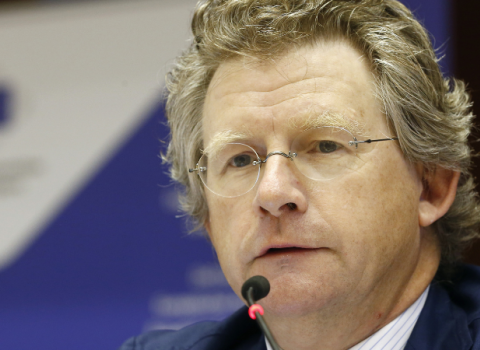European Innovation Council calls for charm offensive, and practical help, to lure start-up founders and staff turned off by Trump

Photo credits: Proxyclick Visitor Management System / Unsplash
A marketing campaign to attract US start-up talent to the EU should be set up this year, according to the board of the European Innovation Council (EIC). The campaign should target European expats working in start-ups, foreign talent facing visa uncertainty and “progressive Americans,” it says in its contribution to the European Commission’s start-up and scale-up strategy, which is due to be unveiled at the end of May.
The US administration’s hostility to foreign tech talent has created a “rare window of opportunity to act,” the board said.
It also proposes setting up a dedicated helpdesk to support relocation and a centralised recruitment platform for EU start-ups. And it wants entrepreneurs who are granted a start-up visa in an EU country to be able to easily extend it to another member state.
The recommendations complement the Commission’s recently announced a €500 million Choose Europe package. This aims to make the EU more attractive to talented international researchers, and is seen as a tacit bid to lure disaffected US scientists to the EU.
A warm European welcome for US start-up founders and other key personnel would be timely, according to Clark Parsons, chief executive of the European Startup Network, and himself a US expat. He identifies a “mind shift” in the European start-up community, including among Europeans working in the US.
“An entire generation of founders and tech leaders is eager to contribute to making Europe a global tech player. We’re tired of being ridiculed by Washington and Silicon Valley,” he told Science|Business.
“If the Commission can tap into our enthusiasm and enable our innovators to found, fund and scale champions here, then we may someday look back on the second Trump term as something of a blessing, given how much he is doing to help Europeans discover their collective identity.”
Fragmentation and funding
In its other recommendations, the EIC board wants to see more done to bring European start-ups and scale-ups into the policymaking process. It says a fractured market and start-up unfriendly regulation have “hurt [the Commission’s] relationship with the ecosystem” and left the EU with a “credibility gap” that requires greater engagement with start-ups in order to rebuild trust.
As a bridge between the Commission and the start-up ecosystem, the board proposes setting up a pilot implementation unit within the EIC.
On the perennial issue of funding and finance for start-ups and scale-ups, the EIC board concedes that Europe will never be able to outspend the US and China. Instead, it should adopt a strategy of “active market-making.”
This would involve directing public and corporate procurement to create demand, with a “choose European tech” campaign to triple public and private sector procurement from European start-ups by 2030. The EIC also hopes to add integrate a pre-commercial procurement component into its challenge-based calls for proposals.
There should also be closer working with deep tech start-ups to shape regulation, and incentives insurance companies and pension funds to invest in European venture capital.
Related articles
- Don’t feel guilty about poaching scientists fleeing Trump, US science body tells Europe
- Hostile US environment for cleantech is an opportunity for Europe, experts say
- EIC will invest in dual-use start-ups, Commission says
The EIC board suggests launching a European scale-up initiative, modelled on France’s Tibi initiative and Germany’s WIN programme, to encourage pension funds, insurers and asset managers to invest in venture capital. It also wants to support fund-of-funds initiatives to strengthen venture capital firms investing in deep-tech start-ups.
Longer term, the EIC calls for an EU-wide stock option framework to be included in the proposed 28th regime, offering employees non-voting shares taxed only upon sale. This aligns with the demands of other groups, including start-up and investor association France Digitale, which recently issued its own contribution to the consultation.
Aligned priorities
France Digitale’s priorities are similar to those of the EIC: improve access to finance by leveraging more private savings to support start-ups; reform public procurement to prioritise innovative European companies; and achieve more harmonised laws across the EU. These aspects of the strategy all depend on one another, said Marianne Tordeux, its director of public affairs.
“That is something everyone has understood,” she told Science|Business. “Having more money through the Savings and Investments Union is great, but it’s not enough if at the same time we don’t also have public procurement to buy the solutions that were financed.”
As for venture capital, France Digitale would also like to see a new fund-of-funds, with the European Investment Fund pooling money provided by institutional investors such as pension funds. “It’s very difficult for pension funds to invest in [venture capital firms], because they lack people to understand where to invest,” said Tordeux.
The association would also like to see Europe be more ambitious in its strategy, following start-ups throughout their entire journey. Instead of stopping at scale-ups, it should be a “start-ups to tech leaders strategy.”
This should include clear objectives, such as at least five European scale-ups to pass the $100 billion valuation by 2030, something no EU-founded start-up has achieved in the past 50 years.
Finally, France Digitale calls for European research and innovation funding to be less fragmented and benefit smaller consortiums or individual companies, with faster and more transparent application and evaluation procedures. It calls for a target of allocating 15% of EU innovation funding to start-ups, up from 5% today.
For its part, the European Consortium of Innovative Universities said in its submission that researchers and students should be assessed and rewarded for their entrepreneurial achievements. It also wants to see encouragement for initiatives such as dual appointments between academia and industry, mentoring programmes, and industry-academia sabbaticals in order to build a more entrepreneurial academic culture.
The universities alliance also argues that protecting inventions should be made faster and cheaper, and state aid rules regarding intellectual property transfer should be clarified. Funding for research results to be commercialised, such as the European Research Council’s Proof of Concept grants, should also be strengthened, it says.





 A unique international forum for public research organisations and companies to connect their external engagement with strategic interests around their R&D system.
A unique international forum for public research organisations and companies to connect their external engagement with strategic interests around their R&D system.